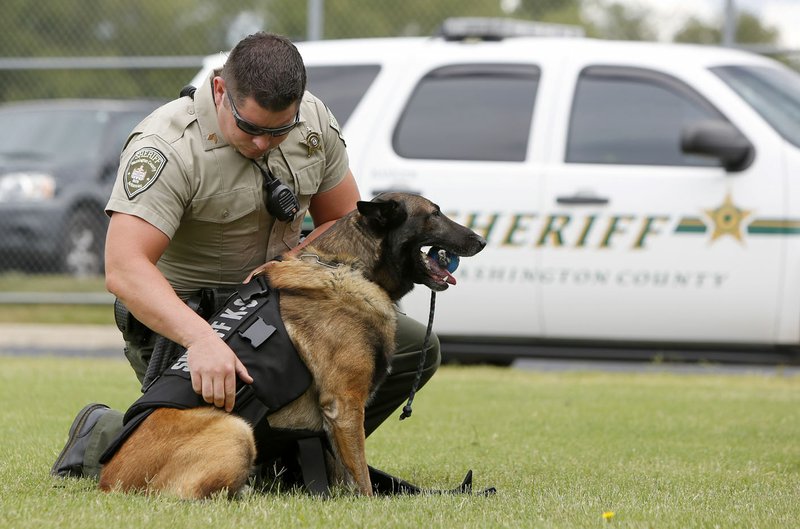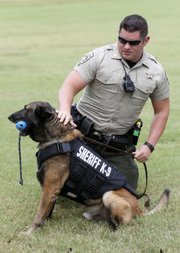FAYETTEVILLE -- Washington County Sheriff's Office Sgt. T.J. Rennie strapped the new protective vest onto Ranger, his police dog partner, and held up a ball as a reward.
Ranger isn't used to the new equipment, Rennie said. The 5-pound, custom-built vest is meant to guard Ranger against shootings and stabbings, Rennie said.
Fast facts
Officials said buying a police dog costs thousands of dollars. The Washington County Sheriff’s Office paid between $5,000 and $10,000 for Ranger, the agency’s only police dog. The Fayetteville Police Department has two police dogs that came from Germany. Other dogs are more expensive, according to the National Police Dog Foundation. A dog fully trained in patrol, detection and hard surface tracking can cost up to $15,000.
Source: Staff report
By the numbers
Northwest Arkansas has about 15 police dogs in its largest police departments — Bentonville, Fayetteville, Rogers, Springdale and Benton and Washington counties. The University of Arkansas also has four police dogs.
• Benton County: Four police dogs
• Washington County: One police dog
• Springdale: Two police dogs
• Fayetteville: Two police dogs
• Rogers: Three police dogs
• Bentonville: Three police dogs
Source: Staff report
"He goes everywhere I go," Rennie said. "If we are able to, if we can do it, there's no reason not to get (a vest) for him."
Washington County Sheriff's Office is the most recent Washington County department to get a vest. The vest arrived about two weeks ago, said Kelly Cantrell, Sheriff's Office spokeswoman. The police dog vests are not 100 percent bulletproof, but they do give the dogs an extra layer of protection, Rennie said.
Law enforcement agencies often seek vests, but some officials say recent incidents where police officers were shot -- including a police dog in Sebastian County last month -- have made people more aware of the need.
"A lot of times you just don't think about it until something happens, like the shooting of a [police dog]," said Mike Godfrey, interim executive director for the Arkansas Sheriffs' Association.
Fayetteville, Springdale, Rogers and Washington County all received vests for their police dogs this year, according to department spokesmen. Some vests -- such as Ranger's -- have taken months of paperwork to get.
Bentonville received three vests for its police dogs last year. Other departments are just starting the application process for a grant for a vest.
The Benton County Sheriff's Office plans to apply for a grant for a vest soon, said Keshia Guyll, Sheriff's Office spokeswoman. Boz, a county police dog, doesn't yet have one, she said.
In Lowell, the Fraternal Order of Police held events in August and earlier this month to raise money for 21 vests, enough for officers and one police dog, said Kris Spangler, order president and a patrol sergeant at the Lowell Police Department. The idea to buy the vests came about in July, after five police officers were shot and killed and seven others were injured by a shooter during a protest in Dallas, Spangler said. Two civilians also were hurt, according to media reports.
Violence has hit closer to home, too, Spangler said.
In August, Sebastian County Sheriff's Office deputy Bill Cooper was shot and killed during a standoff. A Greenwood police dog, -- Kina -- was shot twice during the same incident. Kina was wearing a vest.
Kina ran away after being shot but was found two days later and treated by a veterinarian, according to news releases posted on social media.
Kina's handler wasn't available for comment Friday.
Kina isn't the first police dog officer to be shot, but no Washington County police dog has been, Cantrell said.
Nationwide, about 26 police dogs have been hurt or killed while working, said said Sandy Marcal, president and founder of Vested Interest in K9s Inc., a nonprofit organization that provides law enforcement agencies with vests for police dogs.
"There are more and more dogs getting injured and killed in the line of duty," Marcal said.
Marcal's nonprofit group gave out 520 vests last year, she said. Some agencies have called to say those vests saved their police dogs' lives, she said. The number of vests the group gives out depends on the amount of donations the group receives, Marcal said.
Officers are becoming more aware of the potential risk to their police dogs, she and Spangler said.
"The more often these types of events take place, it just brings it to the forefront (of minds)," Spangler said. "I believe more officers will be adding (vests) to their tool belt."
'Protected'
Law enforcement agencies want to take care of their police dogs, spokesmen said.
"K-9's are a vital part of any law enforcement agency," Springdale police spokesman Lt. Derek Hudson said. "It is important to ensure that they are protected and able to do their job to the fullest as safely as possible."
The dogs find illegal drugs and track people, according to the Washington County Sheriff's Office news release. They can also help police apprehend suspects, Cantrell said.
Ranger recently tracked and located two lost hikers, one of whom needed medical attention, according to the county's news release on Ranger's vest.
Because the dogs are skilled and go into dangerous situations, they deserve protection, law enforcement spokesmen said. Some agencies, such as Rogers, make vests part of all officers' uniforms that are replaced every five years, Foster said. Vests are vital to the job, he said.
"We wouldn't expect a firefighter to walk into a burning building without an air-pack, or anyone in the medical field not having [personal protective equipment] or any other number of occupations needing protective equipment, why would you expect a police officer to not have the protective equipment they need?" Foster said. "I can't imagine any officer in Northwest Arkansas, much less the rest of the country, not having one when they go to work."
However, the vests aren't cheap, and smaller departments struggle to afford them, Foster and Godfrey said.
Rogers puts the $800-per-vest for its dogs into its budget, Foster said. The department doesn't need to raise money, he said. Other departments seek grants or donations, spokesmen said.
Ranger's vest cost $1,050 but was covered by a grant, Cantrell said. Fayetteville's two vests cost about the same amount as the county's, according to police news releases. The vests were paid for through grants, said Sgt. Craig Stout, Fayetteville police spokesman.
A private donor paid for Springdale to buy a vest for about $1,000 this year, Hudson said. Another donation paid for one vest last year, he said.
Spangler didn't say how much the fraternal group plans to spend on vests in Lowell, but on Wednesday, the group announced online Central States Manufacturing, a local business, gave officers $5,400 toward all the vests.
Tactical vests, such as what Lowell police plan to buy, run about $345 apiece for police officers. Cantrell said the Sheriff's Office bought 38 vests at that price for its officers via a grant about two months ago. The vests go on the outside of the uniform and add extra protection, especially against rifle fire, Spangler said.
The shooter in Sebastian County used a rifle, police said.
Fayetteville, Bentonville, Rogers and Washington County received their grants for their vests through Vested Interest in K9s.
Marcal said paperwork to apply for a vest can take about 15 minutes to complete but depends on how computer savvy the applicant is. The application includes photos of the police dog, measurements and a short biography, she said.
The process for getting a vest can a long time, Rennie said. It took five months from the time the Sheriff's Office started the application process to when Ranger got his vest, he said. The work was worth it, he said.
"You can't put a price tag on him," Rennie said.
NW News on 09/18/2016

